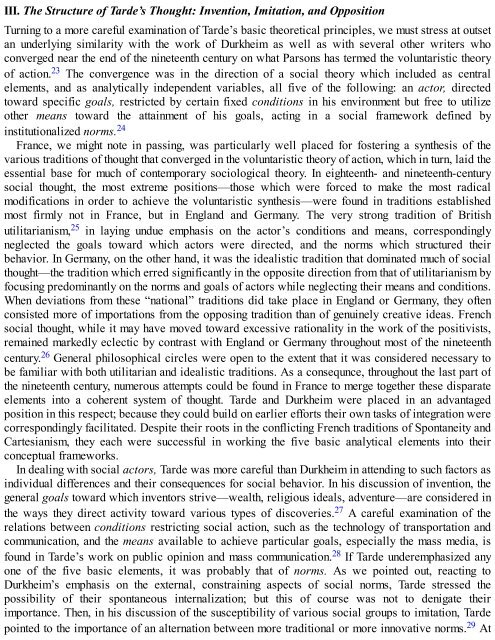3658925934
Create successful ePaper yourself
Turn your PDF publications into a flip-book with our unique Google optimized e-Paper software.
III. The Structure of Tarde’s Thought: Invention, Imitation, and Opposition<br />
Turning to a more careful examination of Tarde’s basic theoretical principles, we must stress at outset<br />
an underlying similarity with the work of Durkheim as well as with several other writers who<br />
converged near the end of the nineteenth century on what Parsons has termed the voluntaristic theory<br />
of action. 23 The convergence was in the direction of a social theory which included as central<br />
elements, and as analytically independent variables, all five of the following: an actor, directed<br />
toward specific goals, restricted by certain fixed conditions in his environment but free to utilize<br />
other means toward the attainment of his goals, acting in a social framework defined by<br />
institutionalized norms. 24<br />
France, we might note in passing, was particularly well placed for fostering a synthesis of the<br />
various traditions of thought that converged in the voluntaristic theory of action, which in turn, laid the<br />
essential base for much of contemporary sociological theory. In eighteenth- and nineteenth-century<br />
social thought, the most extreme positions—those which were forced to make the most radical<br />
modifications in order to achieve the voluntaristic synthesis—were found in traditions established<br />
most firmly not in France, but in England and Germany. The very strong tradition of British<br />
utilitarianism, 25 in laying undue emphasis on the actor’s conditions and means, correspondingly<br />
neglected the goals toward which actors were directed, and the norms which structured their<br />
behavior. In Germany, on the other hand, it was the idealistic tradition that dominated much of social<br />
thought—the tradition which erred significantly in the opposite direction from that of utilitarianism by<br />
focusing predominantly on the norms and goals of actors while neglecting their means and conditions.<br />
When deviations from these “national” traditions did take place in England or Germany, they often<br />
consisted more of importations from the opposing tradition than of genuinely creative ideas. French<br />
social thought, while it may have moved toward excessive rationality in the work of the positivists,<br />
remained markedly eclectic by contrast with England or Germany throughout most of the nineteenth<br />
century. 26 General philosophical circles were open to the extent that it was considered necessary to<br />
be familiar with both utilitarian and idealistic traditions. As a consequnce, throughout the last part of<br />
the nineteenth century, numerous attempts could be found in France to merge together these disparate<br />
elements into a coherent system of thought. Tarde and Durkheim were placed in an advantaged<br />
position in this respect; because they could build on earlier efforts their own tasks of integration were<br />
correspondingly facilitated. Despite their roots in the conflicting French traditions of Spontaneity and<br />
Cartesianism, they each were successful in working the five basic analytical elements into their<br />
conceptual frameworks.<br />
In dealing with social actors, Tarde was more careful than Durkheim in attending to such factors as<br />
individual differences and their consequences for social behavior. In his discussion of invention, the<br />
general goals toward which inventors strive—wealth, religious ideals, adventure—are considered in<br />
the ways they direct activity toward various types of discoveries. 27 A careful examination of the<br />
relations between conditions restricting social action, such as the technology of transportation and<br />
communication, and the means available to achieve particular goals, especially the mass media, is<br />
found in Tarde’s work on public opinion and mass communication. 28 If Tarde underemphasized any<br />
one of the five basic elements, it was probably that of norms. As we pointed out, reacting to<br />
Durkheim’s emphasis on the external, constraining aspects of social norms, Tarde stressed the<br />
possibility of their spontaneous internalization; but this of course was not to denigate their<br />
importance. Then, in his discussion of the susceptibility of various social groups to imitation, Tarde<br />
pointed to the importance of an alternation between more traditional or more innovative norms. 29 At









![Genki - An Integrated Course in Elementary Japanese II [Second Edition] (2011), WITH PDF BOOKMARKS!](https://img.yumpu.com/58322134/1/180x260/genki-an-integrated-course-in-elementary-japanese-ii-second-edition-2011-with-pdf-bookmarks.jpg?quality=85)
![Genki - An Integrated Course in Elementary Japanese I [Second Edition] (2011), WITH PDF BOOKMARKS!](https://img.yumpu.com/58322120/1/182x260/genki-an-integrated-course-in-elementary-japanese-i-second-edition-2011-with-pdf-bookmarks.jpg?quality=85)





